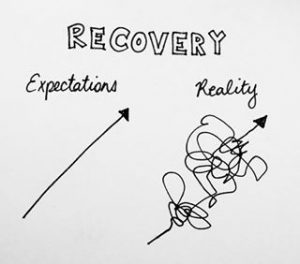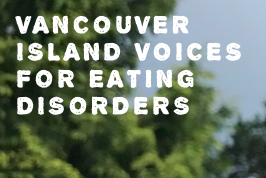“You did not choose to have an eating disorder, but it is your responsibility to choose recovery.”
This is a familiar phrase to those in recovery and it’s an important one; however, as is the nature of most phrases, it is a simplified statement about a complicated subject. Choice.
Choice is a complex and interesting discussion in relation to eating disorders and other mental health issues. It grapples with some of humanity’s most difficult philosophical questions, such as whether or not we have free will.
Philosophical debate aside, we live in a world that functions under the precept that we do in fact have free will and are thus responsible for the choices we make. However, there has been more recognition in recent years that there are factors involved in choice that are beyond an individual’s control. Genetic, socioeconomic, and environmental factors – all of these play a role in shaping an individual’s choices. Not only do these broader factors impact whether or not a person may struggle with an eating disorder, they also influence an individual’s recovery from one.
The thing is, there is not just one choice a person makes to recover – there are multiple choices to be made, multiple times a day. To build towards recovery, an individual is faced with fighting their own thoughts and feelings every day. Even if that individual has professional and personal supports in place, they are still faced with being alone in this fight against themselves for much of the time. For example, therapy for an hour every week or so leaves about 167 other hours for a person to face their recovery alone (in some sense), with every choice that comes up and every challenge it brings with it. An individual recovering from an eating disorder is dealing with an addiction of sorts that cannot be avoided. Those in recovery are faced with multiple emotionally overwhelming moments every day and intense emotions in a given moment make it challenging to make recovery-oriented choices. This is not to say that there is not an element of personal responsibility to recovery, of course we should strive to make our best attempts at choices that keep us directed toward a future free from our eating disorders. However, it is also important to recognize that choosing recovery is not quite as simple as it sounds.
“An eating disorder is much like a well-worn pathway in the brain. It’s familiarity can make It seem natural or normal and sometimes it can completely inhabit our thoughts, feelings, and consequently choices. When we choose to make new choices, we are choosing to create a new pathway in our brain.”
Along with these many choices come many emotions for both the individual struggling with the eating disorder and those around them. The individual may feel an overwhelming sense of guilt for struggling, which may add to their sense of being unworthy of recovery. Carrying around that guilt may lead people to make choices that hurt themselves in the end because they feel they deserve it. The people around them may feel angry at their loved one’s actions or behaviours, because these behaviours can sometimes affect loved ones in negative ways and they may not understand why the person is making these choices.
Of course, eating disorders (and other mental health struggles, for that matter) are not excuses for poor behavior, but I think it can help to understand that choice is not a simple thing and potentially negative behaviours can come from somewhere that very rarely has to do with the intention of causing harm. There is a subtle but significant difference between someone causing harm to another as a byproduct of a choice influenced by a mental health state and a choice made with the intention of causing harm. I do not think that this is an easy concept to measure, but I do think that intention is important to acknowledge in an individual’s choices and actions. That is not to say we should not expect more from someone in recovery, we absolutely should, but hopefully with as much compassion as we can muster. This will always be a complicated issue, as sometimes it may feel incredibly challenging to know how to be in a supportive role for someone recovering. In some way’s recovery is as much a journey for loved ones as it is for the individual going through it.

It can be heartbreaking to watch the ones we love struggle with choices that may not benefit them. Sometimes it can feel hopeless for the person struggling as well as the people who love them. I firmly believe that there is always hope even, if we have no sense of it at all times. It helps to remember that even when there are clouds that cover the sky, the sun is still there behind the clouds, waiting to shine again. People may not always make the choices we think they should.
An eating disorder is much like a well-worn pathway in the brain. It’s familiarity can make It seem natural or normal and sometimes it can completely inhabit our thoughts, feelings, and consequently choices. When we choose to make new choices, we are choosing to create a new pathway in our brain. Every moment we have a chance to take a different route than the one that seems simplest or most familiar. That does not mean it is easy, but it is possible. The little moments and choices that seem insignificant begin to add up and build to something more. By making different choices we are quite literally changing the way our brain works, and this change strengthens every time we choose it. It takes time and practice to develop a new voice, a voice that says something different than the eating disorder voice. A voice that says “no, I’m choosing to do something different this time.” Eventually it is not a question or something we say with hesitation, eventually it becomes our new normal.
 Shaely Ritchey is a registered nurse who graduated from the University of Victoria earlier this year. She works on a surgical unit in Victoria, BC. Originally hailing from Prince George, Shaely has been living on Vancouver Island for the past 6 years and loves it. She is part of a newly formed non-profit society called Vancouver Island Voices for Eating Disorders, or VIVED. Visit VIVED here to learn more. Shaely is herself in recovery from an eating disorder and is very passionate about improving mental health awareness and treatment options and advocating for individuals and families struggling with eating disorders.
Shaely Ritchey is a registered nurse who graduated from the University of Victoria earlier this year. She works on a surgical unit in Victoria, BC. Originally hailing from Prince George, Shaely has been living on Vancouver Island for the past 6 years and loves it. She is part of a newly formed non-profit society called Vancouver Island Voices for Eating Disorders, or VIVED. Visit VIVED here to learn more. Shaely is herself in recovery from an eating disorder and is very passionate about improving mental health awareness and treatment options and advocating for individuals and families struggling with eating disorders.



